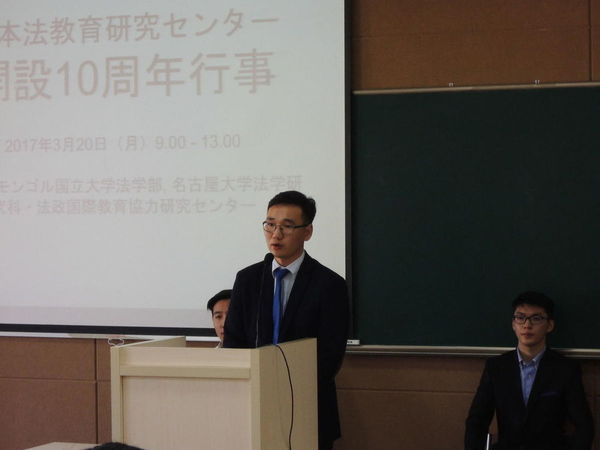*****
The Nagoya University Research and Education Center for Japanese Law (CJL) at the National University of Mongolia held a ceremony last March to commemorate ten years -- since fall 2006 -- of teaching Japanese law in the Japanese language. While attending the ceremony in the Mongolian capital of Ulaanbaatar, I was particularly struck by the quality of the students' speeches.
While the speeches by representatives of the host university and special guests were provided with interpretation, the students provided their own, alternating frequently between Mongolian and Japanese. The first to take the stage was S. Bat-Orshikh, a fourth-year student. "By studying both Japanese and Mongolian law, I have acquired a habit of thinking critically," he said, before observing, "I used to think I was the center of the universe. I've come to realize that that certainly is not the case, and that there's value in knowing and correcting my weak points." L. Amgalanbaatar, also a fourth-year student, commented, "I've developed the ability to view Mongolia's legal system from a relative standpoint." D. Gankhurel, who is in his fifth year, the highest grade in Mongolia's five-year universities, said, "I thought Mongolian law was correct, but I've learned that that's not necessarily true." He went on to describe his experiences with Japanese culture.
 Students of the Research and Education Center for Japanese Law (CJL) in Mongolia give speeches at the center's 10th anniversary ceremony
Students of the Research and Education Center for Japanese Law (CJL) in Mongolia give speeches at the center's 10th anniversary ceremony
All three agreed that studying the two country's laws gave them a new perspective on the world. While listening to their speeches, I became convinced that acquiring such a broadened mindset is one of the main purposes of higher education. I couldn't help but wonder how many university students in Japan have acquired that and can also articulate it in an English speech.
Not surprisingly, these students are among the top in intellectual excellence in Mongolia. Studying Japanese law in the Japanese language while also attending the National University of Mongolia School of Law full-time demands a workload far heavier that of ordinary law students. In fact, many students drop out of the program due to its rigor. Their current numbers illustrate this: There are 16 first-year students, 9 second, third, and fourth-year students, and 4 fifth-year students.....> read more on the Meidai Watch
 |
Atsuko Tsuji: Earned B.A. in Arts, College of Arts and Sciences, the University of Tokyo in 1976. Joined The Asahi Shimbun Company in 1979 as a journalist and wrote many articles in science and technology area for newspaper and magazines published by the company including editorial pieces. Knight Science Journalism Fellow at Massachusetts Institute of Technology in 1989 and Reuters Fellow at University of Oxford in 2014. Designated Professor of Nagoya University's Institute of International Education and Exchange since October 2016.
|